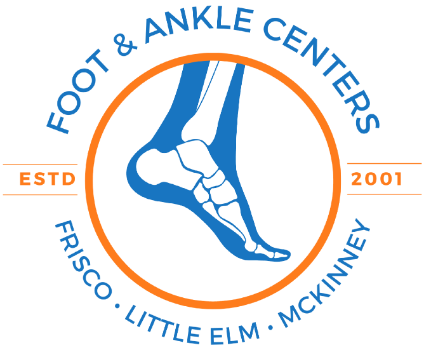Professional Diabetic Foot Care: When to See a Podiatrist at Foot & Ankle Centers of Frisco, Little Elm, & McKinney
If you are living with Type 1, Type 2, or gestational diabetes, or if your doctor diagnoses you with prediabetes, taking care of your feet is an important part of managing your condition. Our podiatrists understand the importance of proper foot care and the impact it can have on your health and well-being. Diabetic foot care is extremely important because of the negative effects that high blood sugar has on feet. Both regular checkups and urgent care for new injuries are important in maintaining your foot health.

Common Conditions Caused By Diabetes
Peripheral Neuropathy
Peripheral neuropathy, or nerve damage, afflicts up to half of all those who have diabetes. Because nerve damage can reduce sensation in your feet, wounds often go undiscovered until they’re quite serious. Once the skin breaks, there is an increased risk of developing an infection due to poor blood flow in the foot. This inability to properly heal wounds and fight infections can then lead to amputation of the foot.
Charcot Arthropathy
One serious complication of peripheral neuropathy is Charcot foot, a type of arthritis in which the foot bones weaken and collapse. Because you don’t feel the initial bone injury, you walk on the injured foot until the joints collapse, eventually leading to “rocker bottom" feet. Other problems include ulcers or wounds that are caused by excess pressure on the skin.
Peripheral Artery Disease
Many diabetics also experience peripheral artery disease (PAD), which happens when fat deposits block or narrow the arteries leading to your feet. PAD causes considerable difficulty with healing foot and ankle wounds. This can significantly increase the risk of wound ulceration and infection.
When you have diabetes, you simply don’t recover from illness efficiently. Although this applies to all parts of your body, your feet are perhaps the most vulnerable area. That makes diabetic foot care a critical part of your disease maintenance.
Calluses & Corns
Calluses and corns may both appear on your foot's weight-bearing surfaces, but they are not the same. Calluses tend to be larger and found at the bottoms of toes or on the sole of your foot at the ball or heel. These are rarely painful, and their appearance is usually smooth, but a different, thicker texture than the surrounding skin.
For corns, it’s typical to find them on other parts of your feet. They may be painful when touched, and there’s often a hard center encircled by inflamed and irritated skin. The skin on both corns and calluses may have a dry or flaking appearance.
If untreated, both calluses and corns can get very thick, break down, and turn into ulcers. Never try to cut calluses or corns yourself—this can lead to open wounds and infections.

What Home Care Tips Can My Podiatrist Recommend?
At Foot & Ankle Centers of Frisco, Little Elm, & McKinney, our podiatrists believe that the best way to prevent foot problems is by working with your primary care doctor or diabetes specialist to manage your blood sugar. In addition, our podiatrists can recommend home care tips that will give you healthy feet.
Your podiatrist can recommend a home care schedule for you, which may include:
- Full daily foot exams that include checking for sores, cuts, blisters, corns, or redness.
- Keep your feet clean and dry.
- Foot washing with lukewarm water and mild soap. Dry them thoroughly, especially between the toes.
- Moisturizing your feet daily (but not between toes)
- Wearing shoes, socks, or slippers that fit properly. Shoes should be comfortable and provide adequate support. Make sure your socks fit snugly and don't have any loose threads or holes.
- Avoid going barefoot or wearing open-toed shoes.
- Trim your toenails regularly. Trim them straight across and smooth any rough edges with an emery board. Never use scissors or other sharp objects to trim your nails.
- Avoid extreme temperatures. If you must stand for long periods of time, alternate between warm and cool surfaces.
- Exercise regularly. Exercise helps keep your feet strong and healthy. Our podiatrists can create an exercise plan that's right for you.
If you have diabetes, it’s important to take steps to protect your feet. At Foot & Ankle Centers, we offer specialized diabetic foot care services to help keep your feet healthy. Our services include regular foot assessments, wound care, custom orthotics, and more. Contact us today to learn more about our diabetic foot care services and how we can help you.
